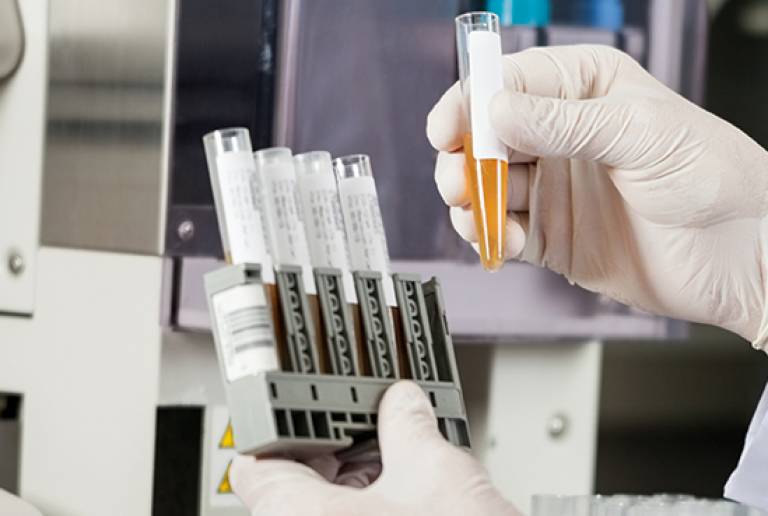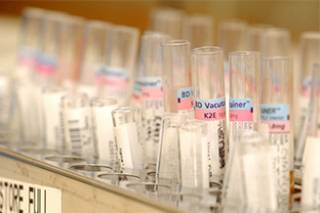New non-invasive test to detect bladder cancer developed
31 January 2017

A new test for bladder cancer could enable GPs to test a urine sample and spare patients the discomfort of a cystoscopy in hospital, according to research published today in Clinical Epigenetics.
The test, called UroMark, has been developed by UCL researchers and uses cutting edge genomic sequencing to detect abnormal cancer DNA in a urine sample. The research team, led by Professor John Kelly (Professor of Uro-Oncology, UCL, and Consultant Urological Surgeon, UCLH) and Dr Andy Feber (Senior Research Associate, UCL Cancer Institute and scientific lead of the study), identified a panel of DNA alterations which are highly specific to bladder cancer and found that when used on DNA from urine, UroMark detected bladder cancer with a high degree of accuracy (98% of cases), equivalent to a cystoscopy, currently the clinical gold standard.
The study was carried out on 300 patients and the UK Medical Research Council has awarded £1.42 million for two larger trials which are currently underway across 32 hospitals. The trials will confirm the accuracy of UroMark before it becomes widely available for clinical use.
Approximately 11,000 people are diagnosed with bladder cancer each year in the UK. For most people, an early sign of bladder cancer is blood in their urine (haematuria), but many patients experience symptoms such as recurrent infection; and the urgency and irritation to urinate.
Normally, patients with blood in their urine are sent to hospital for tests, which include passing an instrument along the water pipe or urethra to inspect the bladder (cystoscopy). The new test will avoid the need for cystoscopy for many patients and can be tested by GPs if cancer is suspected.
Earlier detection
Professor John Kelly said: “We have good evidence that patients, particularly females, are diagnosed late with bladder cancer and often patients visit a GP several times with symptoms prior to detection. Having the UroMark test available to GPs will mean that patients can be tested at an early stage to rule out bladder cancer.”
The team anticipate that UroMark will reduce the costs of having to refer patients to hospital. In the UK around 110,000 cystoscopies are performed each year, at a cost to the NHS in the region of £55.39 million.
UroMark has been developed with funding from the National Institute for Health Research. Professor Kelly and Dr Feber are supported by the University College London Hospitals Biomedical Research Centre
Further information
- Research paper: UroMark - a urinary biomarker assay for the detection of bladder cancer. Clinical Epigenetics
- Dr Andrew Feber academic profile
- Professor John Kelly academic profile
- UCL Hospitals Biomedical Research Centre
- UCLH
- Image source: Shutterstock
Related news

New blood test for prostate cancer could reduce the need for painful biopsies
A UCL research team led by Dr Andrew Feber is developing a blood test that could dramatically improve the way that prostate cancer is diagnosed and monitored, consequently saving thousands of men a year from undergoing painful and unnecessary biopsy tests.
 Close
Close

